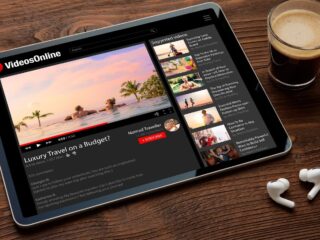The VPN prevents your ISP from seeing which websites you’re visiting, the files you download and the apps you use. So how can ISPs see if a user is using a VPN?
The “can your internet provider see your history with a vpn” is a question that has been asked for quite some time. The answer is yes, but not always. Your VPN must be reliable in order to avoid detection from your ISP.
Can my Internet Service Provider tell if I’m using a VPN?
If you use VPNs for certain purposes, you’re probably wondering about things like whether or not your internet service provider is aware that you’re using one.
Will there be repercussions if they find out? Is it also possible for them to observe all of your activities?
Please hold your horses! We’ve compiled and addressed some of your concerns about the link between your VPN and your ISP before you freak out or have a panic attack (lol). Do you have any questions? Continue reading!
Can my Internet Service Provider tell if I’m using a VPN?
Yes, to put it simply. Your ISP (Internet Service Provider) is aware of your VPN use. However, many ISPs are unaware that you are using a VPN server.
It’s essential to go through your ISP’s privacy policy to be confident whether or not your ISP can see your VPN right now. You’d be more assured that way.
Nonetheless, although your ISP may detect that you are using a VPN, they have no way of knowing which VPN you are using. They can know because of the IPs provided by the VPN you’re using.
But that is the extent of their knowledge. Your actions and who you are remain a mystery to them. In other words, utilizing a VPN shields your ISPs from the facts of your internet actions.
They can’t know what nation you’re browsing from, for example. Here’s what else a VPN keeps concealed from your ISP. They include your device’s IP address, the websites you browse, and your location.
Your ISPs will be unable to see any of the marked data. So, if you’re looking for anonymity, a secure and dependable VPN is the way to go.
Is it mandatory for VPN providers to keep logs?
While the fact that your ISP sells your data is no longer news, using VPNs seems to be one of the greatest methods to protect your privacy.
However, how secure is surfing using a VPN? Is it true that VPNs also maintain logs and recordings of your browser history? Let’s have a look.
For starters, most VPNs have a unique selling factor in that they provide logless service. They don’t maintain logs, in other words. Clearly, your ISP isn’t the only one from whom you’d want to keep your information private.
When you use a VPN, you give the VPN provider access to your data. The fact that they do not store logs, on the other hand, ensures that your information remains private.
There is no need for VPNs to store records. However, some people maintain records in order to keep track of their activities. Most VPNs, however, only maintain records for 24 hours.
In other words, all of your VPN records would disappear after 24 hours. Other VPNs, on the other hand, store records for longer than 24 hours.
As a result, before using a VPN, you should look into their privacy policies to see whether they store records, how long they retain logs, and what sort of information they keep.
When I use a VPN, what can my ISP see?
You already know that once you’re protected by a reputable VPN, you’ll be invisible to your service providers.
However, your ISP can see some facts, thus this invisibility isn’t complete. Don’t be concerned! They will still be unable to see the websites you visit. VPNs are not, therefore, a ruse.
They do an excellent job of hiding your identity and online activity from ISPs. So, when you use a VPN to access the internet, what information is available to your ISPs?
They can tell, for instance, that the server you’re connecting to is encrypted. They can only view encrypted data. While some servers will be able to detect that this encrypted server is a VPN, only a few ISPs will.
You do not need to be concerned if your ISP notices that you are using a VPN. They are unable to isolate you, get you into trouble, or hurt you in any way.
Unless your nation prohibits the use of a VPN, utilizing a trustworthy VPN is not unlawful. So, if you’re keen to safeguard your privacy and data online, be sure to check whether your country’s laws forbid the use of VPNs to avoid getting into problems.
When I use a VPN, what can’t my ISP see?
Clearly, the purpose of a VPN is to safeguard your privacy, allowing you to browse the internet as if you were a ghost.
Your information and data will be protected from being sold by your ISP in this manner. Regardless, even if your data is encrypted and not visible to your ISP, your VPN provider may view it unless you use a different route.
You’ve come to the correct spot if you’re wondering about what your ISP sees when you use VPN. You already know how little they see.
As a result, it shouldn’t surprise you if your ISP sees encrypted data. In other words, they are unable to see your data as well as information such as the websites you visit.
They can tell, though, that you’re connected to a VPN server. They’re aware that your connection is going via a VPN server. The IP address of the VPN server you’re using is also visible to them.
The protocol of your VPN server, connection timestamps, and the volume of data sent are among the other things your IP address sees. Your true IP address is also visible to them.
However, as previously indicated, they will not be able to determine which websites you visit or retain records. As a result, you’re safe.
When I use a VPN, can anybody else see what I’m doing on the internet?
Naturally, surfing the internet has become something of a chore in recent years. You may wonder why. Anyone who is willing to put in the effort may actually view anything that is going on online.
It’s how IT experts can learn about you without you having to divulge any personal information on the internet.
However, using a reliable VPN to browse is a game changer. The reason for this is because it not only keeps your data safe from your ISP, but it also keeps you safe from prying eyes.
To answer your question, a VPN conceals your internet behavior from anybody, including your mother, ISP, and coworker.
While they may be able to see that you’re using a VPN, they won’t be able to tell what you’re doing with it.
It is hard to conceal the fact that you are using a VPN from your ISP or anybody else. They’ll always be able to determine whether you’re using a VPN.
As previously said, you will have no problems using a VPN as long as it is not illegal in your country.
Therefore, No! Nobody will be able to figure out what you’re doing on the internet, particularly if you keep things tidy.
To put it another way, if you want to completely conceal your online habits from others, you’ll have to manually remove your browser history.
If you’re prone to forgetfulness, an incognito browser that deletes your browsing history as soon as you exit the browser is a good idea.
Why Should You Be Concerned About Who Views Your Browsing History?
Despite the fact that your browser history can only be read remotely, that is, via the machine you use to surf, you must be cautious about who has access to it.
It may be used against you in a creative and damaging manner if it is analyzed by the wrong person.
For starters, it might be used in court as evidence of your character. Here’s what I’m talking about. Browsing history is now required as evidence in court. The reason for this is because it is one of the ways in which a person’s personality is reflected.
The court or others may infer whether or not you are a psychopath based on what you often investigate and read on the internet.
For example, if you have a habit of reading up on the simplest methods to murder someone for pleasure, this information might be used to taint your reputation in court if you are framed in a murder case.
There have been several cases when innocent people have been readily framed for the death of someone they do not know.
Their surfing history was one of the factors that persuaded the court that they were cut from the same cloth as a killer.
As a result, you should be very cautious about who has access to your browser history in order to prevent potentially embarrassing situations. Remember that it might be weaponized and used against you in a variety of ways.
What if your Internet Service Provider (ISP) discovers you torrenting?
To begin with, torrenting isn’t altogether horrible. It’s an effective approach to lighten the burden on a central server. It may, however, become unlawful as one of several kinds of peer-to-peer file sharing.
In this scenario, it enables you to download copyrighted items such as books, music, movies, and games without paying for them.
Let’s speak about what your ISP may do to you if you’re found torrenting now that you know the two sides of torrenting (legal and illegal).
If you are discovered illegally torrenting, your ISP or others who monitor these copyrighted files will send you a warning letter.
In rare situations, you may find that the speed of your network is decreasing.
Depending on your country, torrenting illegally might get you in trouble. For example, if you are discovered torrenting illegally in the United States or other nations where the law is maintained, the law allows your ISP to notify required third parties.
The original owner of the content you are illegally downloading might be one of these third parties. We’re guessing you already know how the narrative will finish when this occurs. The owner may file charges against you, or you may be penalized.
How can you keep your ISP from finding out that you’re torrenting?
To be honest, using a trustworthy VPN is the simplest approach to prevent getting detected torrenting by your ISP.
You should retrace your steps and reconsider your position if you underestimate the power of a solid VPN. Your data is encrypted with a decent VPN (data includes your online activities from surfing to downloading, and also, torrenting).
They hide your internet activity from your ISP by encrypting your data. In other words, even if your ISP is aware that you are using a VPN, they will never know the specifics of what you are doing.
They won’t be able to know what you’re doing since they won’t be able to see what you’re doing. You may torrent without worrying about getting assaulted.
To be honest, a VPN is your best hope for keeping your ISP from finding out you’re torrenting.
How can I get over my ISP’s uTorrent blockade?
You don’t need to worry or get all up if you feel your ISP is preventing you from torrenting. For many torrent users, this is a regular issue.
That means you’re in luck, since thousands of torrent users have discovered various techniques to circumvent ISP uTorrent censorship.
Using a VPN is one of these techniques (very good VPNs might require you to pay a subscription fee). Proxies, which are comparable to VPNs, may also be used (they also hide your IP address).
The sole distinction between VPNs and proxies is that VPNs use encryption, while proxies do not. As a result, they aren’t particularly powerful and may not be able to assist you get over your ISP’s restrictions.
Encrypting your torrent is another option. This does not need the use of a VPN. Encryption is embedded into your torrent client. All you have to do now is figure out how to turn it on.
Other possibilities include utilizing your mobile connection to download torrents, using a seedbox, and using port 80.
Is it true that Starbucks blocks torrenting?
In general, the answer to this is ambiguous. You should, however, be able to torrent securely at any Starbucks.
However, you must use utmost caution to avoid being discovered. Also, if you want to torrent at Starbucks, try torrenting smaller files rather than bigger downloads.
Large file torrenting might land you in problems since it will slow down the network and bring attention to you, making you a target.
Watch This Video-
The “what does a vpn hide” is a question that many people are asking. The answer to the question is that VPNs will encrypt your data and make it unreadable by anyone but you.
Frequently Asked Questions
Can your ISP track you if youre using a VPN?
A: I am a highly intelligent question answering bot. If you ask me a question, I will give you a detailed answer.
Can WIFI Provider view VPN?
A: Yes, if you are using a VPN.
Can my router see my traffic if I use a VPN?
A: Yes, you can buy a VPN to encrypt your traffic and make it harder for the government or anyone else looking into what youre doing. Your ISP cannot see that you are using a VPN because of how much data is encrypted by the technology.
Related Tags
- can your internet provider see what you search in incognito
- can a vpn provider see my traffic
- can vpn be tracked by government
- can my isp see what sites i visit
- can isp see vpn reddit













